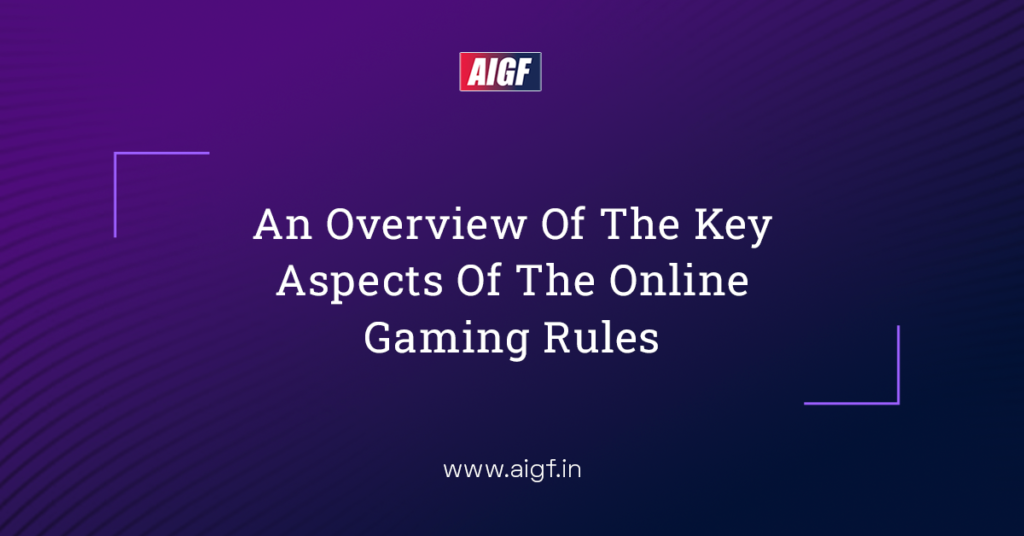The Indian government has notified the amendments to the Information Technology (Intermediary Guidelines and Digital Media Ethics Code), Rules, 2021 in order to provide, inter alia, a comprehensive regulatory framework for “Gaming Rules” for the online gaming industry.
An Overview Of The Key Aspects Of The Online Gaming Rules
The Indian government has notified the amendments to the Information Technology (Intermediary Guidelines and Digital Media Ethics Code), Rules, 2021 in order to provide, inter alia, a comprehensive regulatory framework for “Gaming Rules” for the online gaming industry. While the majority of the provisions of the final framework are in line with the draft framework issued by the government in December 2022 for public consultations, some of the provisions of the draft framework were not incorporated in the final framework in view of the suggestions of the stakeholders.
The primary intention of the Indian government is to regulate (a) the ‘online pay-to-play games’ i.e., the online games where the users make deposits in cash or kind with the expectations of earnings winnings on that deposit, and (b) the online gaming intermediary who enables the users to access any permissible online pay-to-play game “Gaming Intermediary”.
With the notification of the Online Gaming Rules, every online gaming intermediary would first need to determine whether or not the online game offered by such intermediary falls within the ambit of an ‘online pay-to-play game’. An online pay-to-play game would need to comply with certain parameters in order to qualify as a permissible online pay-to-play game. The primary responsibility of ensuring whether or not an online pay-to-play game satisfies the prescribed criteria lies on the head of the self-regulatory bodies “SRBs”.
In the interest of the sovereignty and integrity of India or security of the State or friendly relations with foreign States or public order, or preventing user harm (i.e., any effect which is detrimental to users), the Indian government may require any online game to comply with the Online Gaming Rules as if it is a permissible online pay-to-play game and thereupon, such gaming intermediary would need to adhere to the requirement including SRB’s certification.
SRBs would be required to devise a framework for online pay-to-play games. Such framework would include, inter alia, (a) the measures to ensure that such online pay-to-play game is not against the interests of sovereignty and integrity of India, security of the State, friendly relations with foreign States and public order; (b) the safeguards against user harm, including self-harm and psychological harm; (c) the measures to safeguard children, including measures for parental or access control; and (d) the measures to safeguard users against the risk.
Every online pay-to-play game would need a certification from an SRB before it can be offered to users in India. An SRB may declare such online pay-to-play game as a permissible online pay-to-play game if it is satisfied that such online pay-to-play game (a) does not involve pay-to-earn on any outcome; (b) complies with the requirements (such as no pay-to-earn) prescribed in the rules; (c) complies with the framework devised by such SRB; and (d) complies with the provisions of any law relating to the age at which an individual is competent to enter into a contract.
The term “user harm” has been defined to mean any effect which is detrimental to a user or child, as the case may be. This is a very subjective criterion and it would be interesting to see how the Gaming Intermediaries and the SRBs would ensure compliance with the same.
The certification by the SRBs would not be sacrosanct and it can be revoked or suspended if an online pay-to-play game no longer complies with the prescribed requirements. It also appears that while certifying an online pay-to-play game, the SRBs may prescribe some validity period for such certificate post-expiry of which the Gaming Intermediaries may have to approach the SRBs for renewal. Additionally, if the Indian government is of the view that the certification of an online pay-to-play game by an SRB is not in conformity with the Gaming Rules, it may direct the SRB to take necessary measures to rectify the same.
The Gaming Intermediaries would not be allowed to finance (itself) by way of credit or enable third-party financing for the purpose of playing such online pay-to-play games. It is pertinent to note that some online games offer credit points to first-time users to play games. It would need to be assessed whether such offerings would fall within the ambit of the above-mentioned prohibition.
The Gaming Intermediaries would also be required to inform their users regarding the policy related to withdrawal or refund of the deposit, the manner of determination and distribution of the winnings, and the fees and other charges payable by the user; the KYC procedure, and measures for the protection of deposits. While it is not clear whether the deposits made by the users will have to be refundable in nature or such amount may be adjusted against the fee or user charges, the applicability of the deposits-related rules of the [Indian] Companies Act, 2013 may need to be assessed depending upon the nature of the deposits and terms and conditions of the online games.
Every Gaming Intermediary shall be obligated to identify its users and verify their identity before accepting any deposit. It shall be required to follow the KYC regulations/directions prescribed by the RBI, however, the Gaming Rules have not clarified the permissibility of the outsourcing of KYC functions by the Gaming Intermediaries to a third party. Further, it is pertinent to note that in the process of identification and verification of the users, the Gaming Intermediaries are likely to gain access to certain sensitive personal information/data of the users. There is no provision in the Gaming Rules with respect to the storage location of such sensitive personal data.
Every Gaming Intermediary shall be required to have a physical contact address in India. Such Gaming Intermediaries would also be required to appoint (a) a chief compliance officer, (b) a nodal contact officer, and (c) a resident grievance officer. All these individuals would need to be Indian residents. In view of the above, the overseas online gaming entities which do not have any physical presence in India but offer online games which are accessible to the Indian residents as well may have to re-look at their business model if their online games qualify as online pay-to-play games.
There have been some very interesting developments in the online gaming space at the state level also. The online gaming rules notified by the Indian government do not impose any blanket restriction on any particular category of online games, however, the state of Tamil Nadu has enacted and notified the Tamil Nadu Prohibition of Online Gambling and Regulation of Online Games Act, 2022 (“TN Act”) which prohibits online rummy and poker from being offered in the state of Tamil Nadu. Amongst the other requirements, the local online game providers would need to obtain a certificate of registration from the Tamil Nadu Online Gaming Authority. Further, the non-local online game providers would need to ensure compliance with the due diligence and/or geo-blocking5 requirements set out in the TN Act. As per the reports, the All India Gaming Federation and several online gaming companies have challenged the validity of the TN Act.
While the online gaming rules would certainly provide a boost to the online gaming ecosystem of India, there are various aspects of the rules which require clarification. Hopefully, the Indian government will issue necessary clarifications in the coming days for easy and smooth implementation of the newly notified rules.
Credit: Lexology











Comments
Comments are closed.